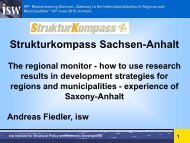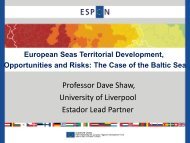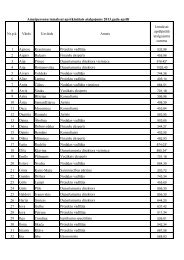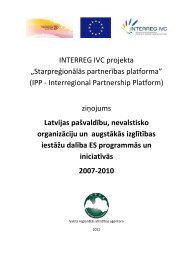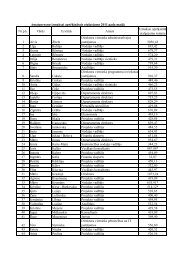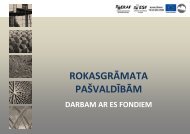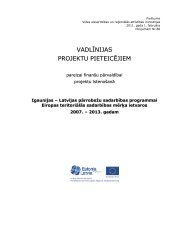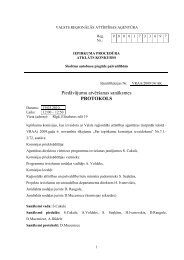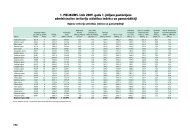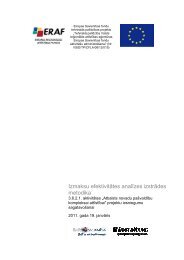Benchmark Study 1
Benchmark Study 1
Benchmark Study 1
You also want an ePaper? Increase the reach of your titles
YUMPU automatically turns print PDFs into web optimized ePapers that Google loves.
IPP 1st BENCHMARK REPORT<br />
rationalizing all the activities related to waste, generated or managed by the Valencia Region, according<br />
to the European Union prescriptions.<br />
The region government makes an important researching effort in the study of alternative, non<br />
conventional means for obtaining water in prevision of drought periods, such as wastewater treatments,<br />
desalinization or exploitation of deep groundwater, as well as the development of tools and strategies<br />
for conjunctive management and water saving that allow to optimize the water resources management.<br />
Such tools are based on the use of water transfers for optimizing the water surpluses among basins.<br />
The Regional Government has developed other important actions related to improve the water<br />
management through the reuse of wastewater for industry, agriculture, urban gardening, street<br />
cleaning, and modernization of irrigation system. More actions are related to the environmental<br />
restoration; improving wetlands, reconditioning shorelines and habitats, and improving general water<br />
quality. In particular, the following actions have been implemented:<br />
Regional competences on irrigation, distribution, sanitation and quality of coastal water.<br />
Municipal competences on urban water. Several actions planned by the different<br />
Administrations.<br />
Basic Objetives at Regional Level in Water: It guarantees the water supply in quantity & quality<br />
for present & future needs. It protects the quality of water & the aquatic ecosystems associated<br />
to rivers and wetlands. It promotes sustainability in the use of water, environmental & financial<br />
actions giving with priority to the management services. It minimizes the risks of extreme<br />
situations, drought & floods.<br />
The Master Sanitation Plan was executed during the years 1993-2000 and 2001-2008, with an<br />
investment respectively of 533 M€ and 1,054 M€. It represented the construction or redesigning<br />
of the 300 Waste Water Threatment Plants (WWTP) in towns with more than 500 inhab..<br />
An amount of 503 hm3 of sewage waters were treated in the Region of Valencia in 2009. In the<br />
same year, an amount of 308,8 hm3 (61,4%) of sewage waters was treated, recycled and<br />
regenerated, and the 98,8% out of 500,000 tons of sewage sludge were re-used. The WWTP<br />
covered a regional population rate of 99,98%.<br />
Nowadays, the Region of Valencia is one of the most advanced region in Europe with<br />
reutilization infrastructure, with 35 big WWTP with capacity for 368 hm3/year with 3 rd level or<br />
advance treatment. It recordes 1,500 Km among repaired irrigation ditch and pipelines, more<br />
that 5,000 Km of pressured pipelines, 17 desalinization plants with a production of 20 hm3/y.,<br />
13 WWTP with biogas recovery with a production higher than 23.Mill Kwh, and 1 WWTP with<br />
PV Solar Energy Production, 167.093 Kwh in 2009.<br />
The Territorial Strategy of the Comunidad Valenciana is defined in the DECRETO 1/2011, de 13<br />
de enero, del Consell, por el que se aprueba la Estrategia Territorial de la Comunitat<br />
Valenciana. It foreseen 25 main objetives and 100 targets.<br />
The Strategy to prevent Climate Change in the Comunidad Valenciana is defined in the<br />
Estrategia Valenciana ante el Cambio Climático 2008-2012. 125 medidas para la mitigación y<br />
adaptación al cambio climático, which foreseens 125 actions.<br />
Page 55<br />
www.i-p-p.eu



